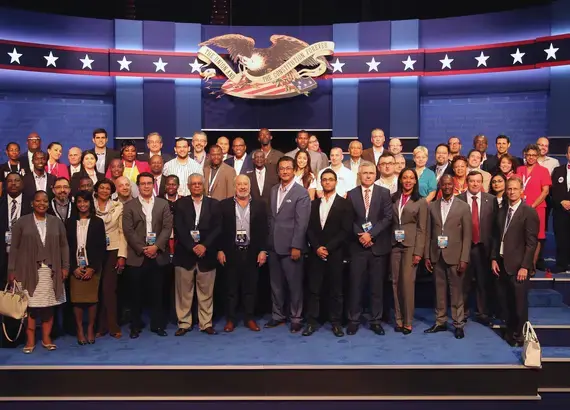
International delegates on the CPD presidential debate stage at the Debate Visit and CPD-NDI International Debate Symposium in October 2016 at University of Nevada, Las Vegas in October 2016.
Success Story
Debate Practitioners Share Lessons at Final U.S. Presidential Debate
Voters around the globe are increasingly demanding that candidate debates become an indispensable part of their country’s elections. Often the culminating moment of the election campaign, debates like no other forum put contending candidates side by side on the same stage to contrast their leadership styles, visions and policies. But making debates a reality in young and even established democracies is far from a given. A range of political, organizational and production hurdles can defeat even the most committed debate sponsor. To brainstorm ways to tackle universal debate challenges, 50 international visitors from 28 countries shared approaches and experiences at an international debate symposium and attended the final U.S. presidential debate between Hillary Clinton and Donald Trump at the University of Nevada, Las Vegas (UNLV) October 19, 2016.
The international debate practitioners, who represent civic groups, media outlets, election authorities and media regulatory bodies in their home countries, came to learn from each other and watch the Trump-Clinton matchup staged by the U.S.-based Commission on Presidential Debates (CPD), an independent non-profit organization that has sponsored and produced all 30 general election debates since 1987.
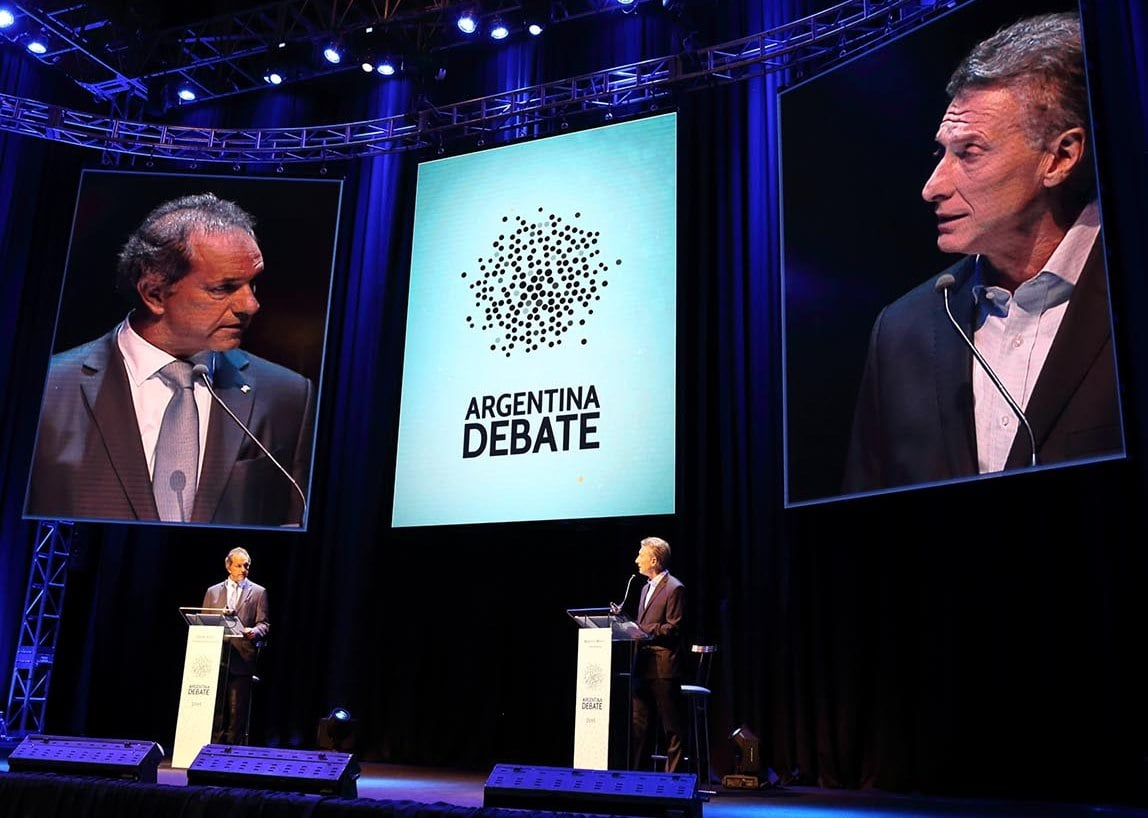
Then presidential candidates, Daniel Scioli and Mauricio Macri, at the Argentina Debate forum on November 15, 2015, at the University of Buenos Aires Law School.
The Oct. 16-20 symposium focused on approaches to organizing and broadcasting debates. Throughout the symposium, participants emphasized the importance of candidate debates, which are often cited as the single most important factor in helping voters decide whom to support. Debates allow voters to see candidates up close without scripts or teleprompters so they can make judgments on the candidates’ knowledge, intelligence and performance under pressure. The importance of debates to voters was evidenced by the more than 70 million American voters (and millions of overseas viewers) who tuned into the final U.S. debate at UNLV.
The symposium agenda included:
- debate case study presentations from all the countries;
- a backstage production tour of the CPD presidential debate;
- research and advocacy approaches to encourage candidates to debate;
- legal challenges to debates and organizers; and
- boosting debate impact through technology and social media with representatives from PBS NewsHour, Microsoft, and Facebook.
Participants also took part in classroom discussions with UNLV students and faculty on U.S. and international debate experiences, shared their impressions of the UNLV debate and made plans for future regional collaboration.
In one symposium session, representatives from Argentina Debates (Argentina Debate, AD) provided lessons from their historic 2015 effort to hold the country’s first presidential debates and overcome a longstanding practice where candidates ahead in the polls would not debate. AD’s efforts included:
- a multi-year advocacy campaign with academic, civil society, business and media allies to generate interest and support for debates;
- a transparent and inclusive negotiation process with the political party representatives on the arrangements for the debates; and
- a historic collaboration between leading print and electronic media outlets, which included airing the debates as a shared TV broadcast without charge in the spirit of providing a public good to all Argentines.
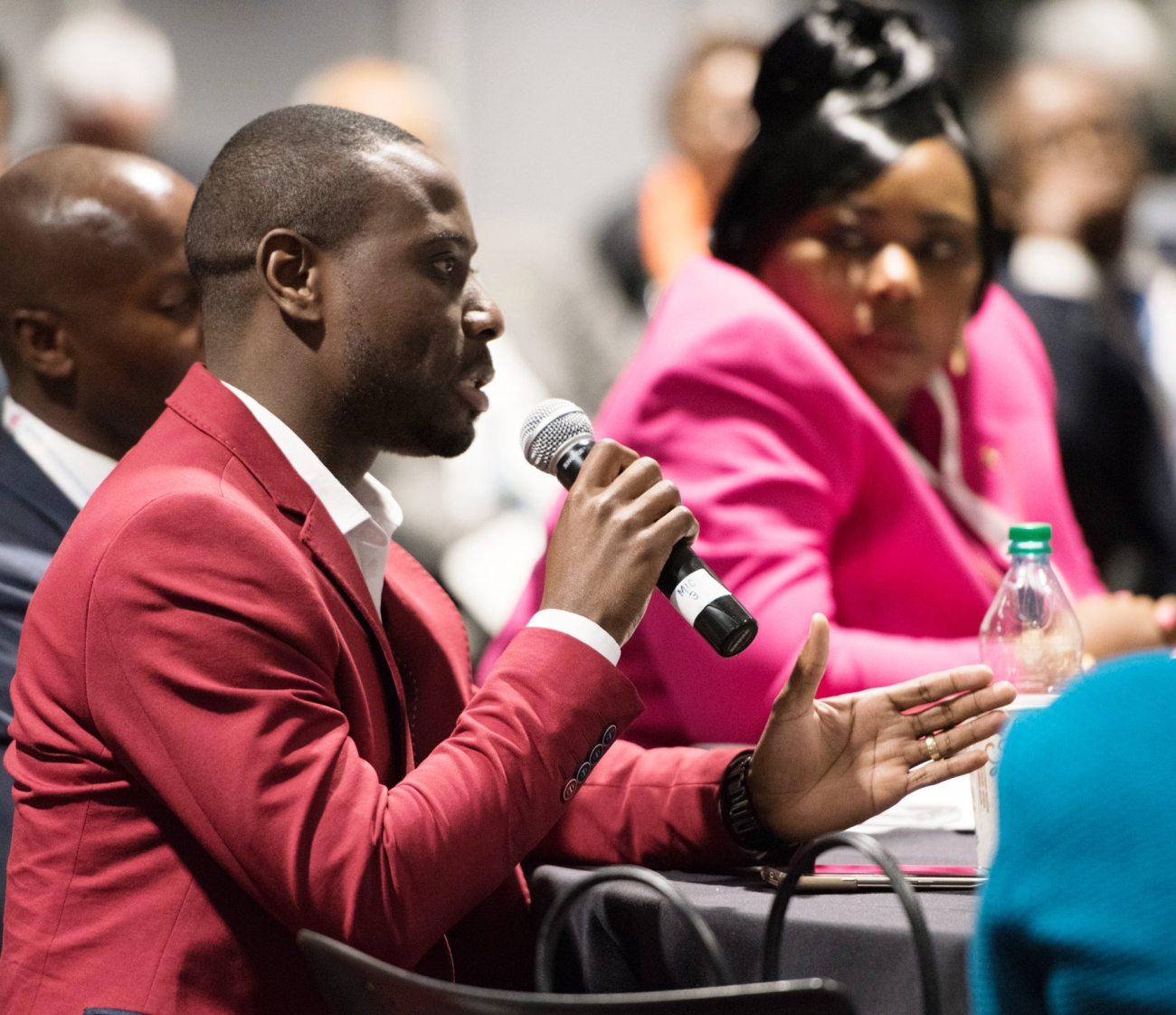
A participant comments at the CPD-NDI Debate Visits and International Debate Symposium at the University of Nevada, Las Vegas in October 2016.
The group’s hard work and commitment paid off. AD made history by holding the country’s first presidential debates watched by more than 16 million viewers, surpassing the audience for the 2014 World Cup Final in Brazil, a notable achievement in a soccer-devoted nation. The debate also generated nearly 5,000 print and electronic stories and trended globally on Twitter, increasing impact among voters.
Argentine political analysts noted that the decision of the incumbent party candidate Daniel Scioli to skip the first AD debate had a high political cost among voters. Expecting an easy win, his first round victory was unexpectedly narrow, necessitating a run-off election that he lost. Moreover, the debates gave political momentum to the Argentine Congress’ passage in late 2016 of a law mandating presidential debates as a permanent part of future elections. The law includes sanctions for candidate no-shows, such as a loss of publicly funded campaign TV and radio advertising spots and an empty chair on the debate stage to highlight their absence.
A leader of the Jamaica Debates Commission (JDC) discussed public opinion research showing that the then incumbent prime minister, Portia Simpson Miller, lost the February 2016 general electionsin large measure due to her decision to break with tradition and public expectations and forgo debating her opponent. Her decision to avoid debating was highlighted and condemned by print and electronic media alike and widely discussed on talk shows and social media, causing a backlash among the electorate. Prime Minister Simpson Miller’s lead in the polls evaporated over a weekend. The parliamentary election was tight and the prime minister’s party lost by one seat in a surprise defeat.
The JDC’s independent poll found that 35 percent of those surveyed changed their vote to the opposition because of the former prime minister’s decision to dodge debates. This finding was echoed by a party leader in a rare public evaluation of the election loss: "Among the findings indicated by our post-election polls and focus groups, the decision not to participate in the national debate was a fatal error. It contributed to the impression that the party was arrogant and took the electorate for granted.” Having subsequently recognized the importance of debates to the voters, the party took part in JDC Local Government debates in November 2016.
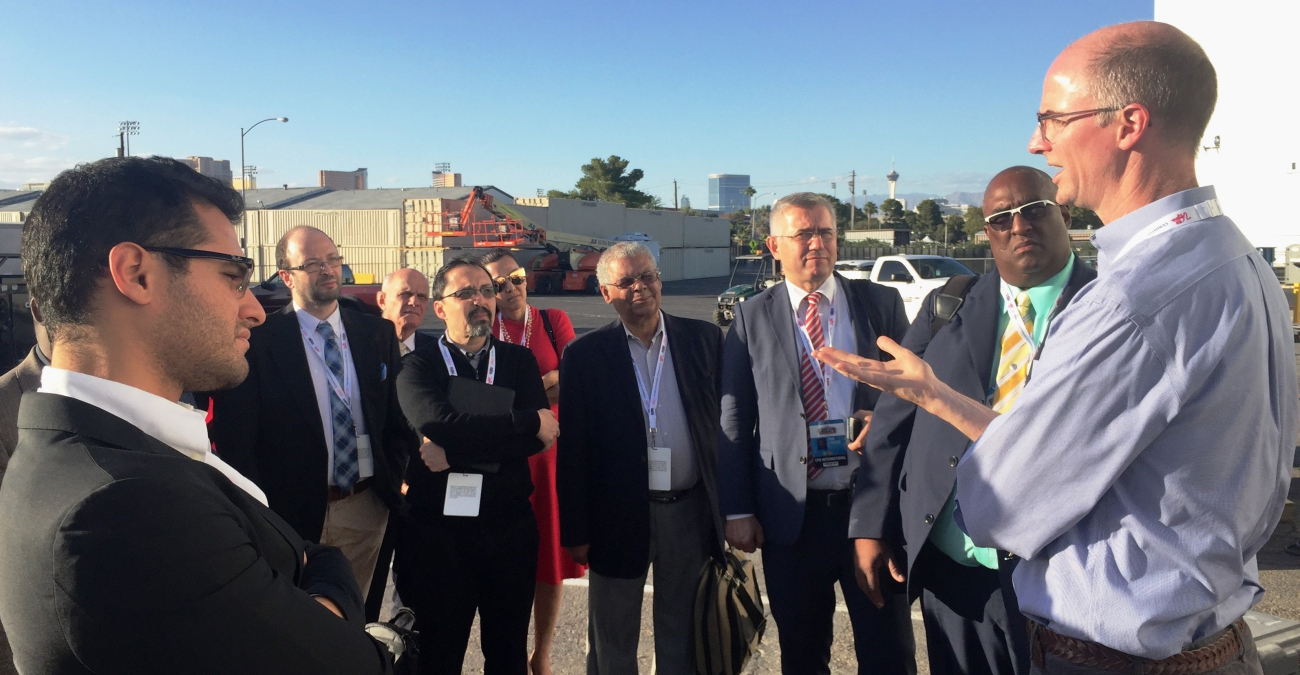
International delegates with media TV production expertise are briefed by the FOX Special Events Pool director at the production truck outside the Thomas and Mack Center debate hall at the University of Nevada, Las Vegas at the Debate Visit and CPD-NDI International Debate Symposium in October 2016.
International participants highlighted that the JDC survey will serve as an important advocacy tool for encouraging candidates to debate or face real consequences with voters who increasingly expect aspirants to face the electorate in such forums.
In addition to sharing lessons among international participants, U.S. speakers at the symposium provided insights into the American elections, the impact of the U.S. debates in the campaign and insights from current CPD moderators on their roles. Presenters included Dan Balz, chief correspondent for The Washington Post, Martha Raddatz of ABC News and co-moderator of the second US presidential debate; Elaine Quijano of CBSN and moderator of the only vice presidential debate; Norman J. Ornstein, political scientist and resident scholar, American Enterprise Institute; and Frank Fahrenkopf and Mike McCurry, CPD co-chairs.
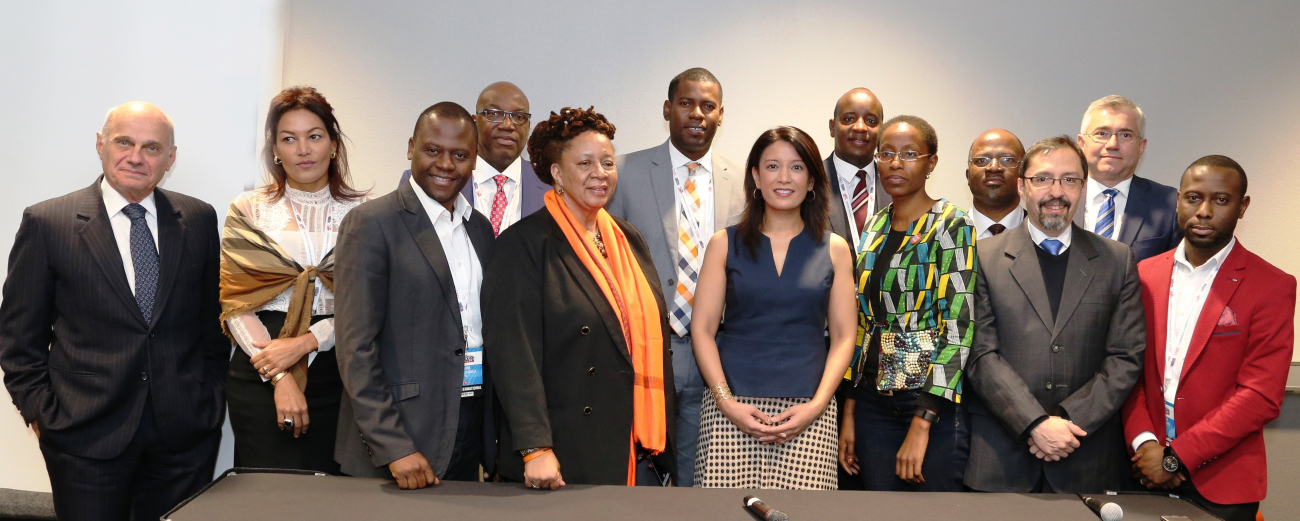
Debate moderators from nine countries with CPD vice presidential debate moderator Eliane Quijano.
The international visitors took away a number of lessons such as:
- use of social media to enable citizens to give input for candidate questions and promoting voter education;
- the importance of building a culture of debate, which can include establishing an independent, nonpartisan debate commission;
- the benefits of hosting debates on university campuses to engage students; and
- the role and responsibilities of the moderator.
Upon their return, the participants put the shared insights into immediate practice. This included informing ongoing discussions of legislation to create a national debate sponsor in Nigeria, mandating debates to promote civic education in Malawi and adapting new moderator formats. Caribbean groups also gathered to witness a Jamaican local government debate and take part in a regional exchange to further sharpen debate organizing skills.
Many participants at the UNLV debate gave interviews, filmed their own video spots and drafted articles, media releases and pro-debate editorials. This media outreach helped promote debates in their own countries and respective regions. More than 20 TV and radio stories and print pieces were broadcast or published on C-SPAN, the BBC World Service, Business Mirror of Manila, The Cable (Nigeria), Continental Broadcasting Services – Nigeria, Huffington Post, Jamaica Gleaner, SunStar Manila, Telemundo, Trinidad and Tobago Guardian Online and Voice of America, among others.
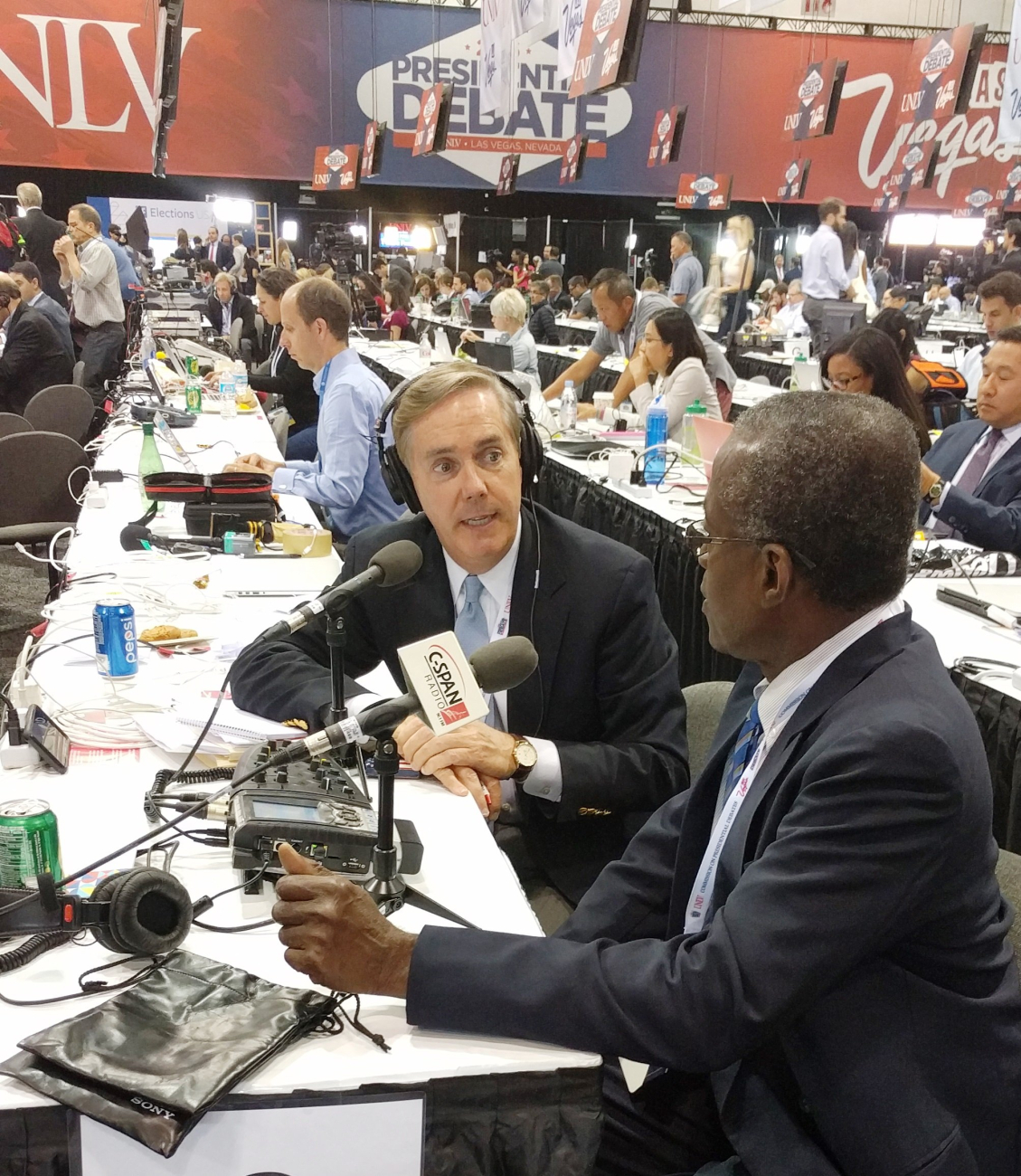
C-SPAN Senior Executive Producer and Political Editor Steve Scully interviews a representative of the Jamaica Debates Commission at the Media Filing Center at the CPD-NDI Debate Visit and International Debate Symposium in October 2016 at the University of Nevada, Las Vegas in October 2016.
The CPD leadership also highlighted the work of the international visitors on live TV prior to all four presidential and vice presidential debates. At UNLV, Mike McCurry recognized the international delegation and the practical benefits of sharing debate lessons: “We learn from them, they learn from us and overall we globally improve democracy.” The printed CPD debate program provided to the CPD debate audiences featured a description of the international debate activities and a case study of the 2014 presidential debates in Malawi.
The debate visit and symposium was sponsored by NDI, the CPD and UNLV. The visitors came from Argentina, Brazil, Chile, Colombia, Curacao, Dominican Republic, Ghana, Guatemala, Guyana, Haiti, Jamaica, Kenya, Lebanon, Liberia, Malawi, Mexico, Morocco, Nepal, Niger, Nigeria, Paraguay, Peru, Philippines, Serbia, Sierra Leone, Trinidad & Tobago, Uganda and Zambia. The majority of visitors belong to the Debates International network, an association created in 2009 with CPD and NDI assistance that now has more than 25 member countries. Its goal is to foster ongoing exchanges of expertise and hands-on support among members to establish or improve debates around the world. The symposium and visit were made possible through the support of the Howard G. Buffett Foundation.
